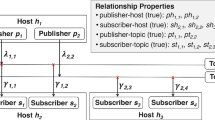Abstract
This study designed a data broadcasting method called evolved broadcast scheduling algorithm (eBSA) to further support LTE evolved multimedia broadcast/multicast services (e-MBMS). This eBSA provides new scheduling technology for e-MBMS and a new information searching method for user equipments that simultaneously conserves user equipment energy and maintains favorable access latency of broadcast messages. The eBSA constructs index and message channels based on the message popularities, using the index channel to guide user equipments to rapidly locate the position of the desired message in the message channel. Consequently, a short mean access time and mean turning time can be attained. The results of numerical analysis verify that when access messages possess skewed access characteristics, the proposed eBSA method performs exceptionally. Additionally, by adequately adjusting the parameter provided by the eBSA method, the optimal tradeoff between energy conservation and access latency performance can be attained.













Similar content being viewed by others
References
Barbara, D. (1999). Mobile computing and databases—a survey. IEEE Transactions on Knowledge and Data Engineering, 11(1), 108–117.
3GPP RP-090350, “WID for MBMS support in LTE” (2009).
3GPP TS 36.300 V9.0.0, “E-UTRA and E_UTRAN, Overall description, Stage 2” (2009).
3GPP TS 36.321 V9.0.0, “Evolved Universal Terrestrial Radio Access (E-UTRA) Medium Access Control (MAC) protocol specification” (2009).
Liaskos, C. K., Petridou, S. G., & Papadimitriou, G. I. (2010). Cost-aware wireless data broadcasting. IEEE Transactions on Broadcasting, 56(1), 66–76.
Yao, Y., Tang, X., Lim, E.-P., & Sun, A. (2006). An energy-efficient and access latency optimized indexing scheme for wireless data broadcast. IEEE Transactions on Knowledge and Data Engineering, 18(8), 1111–1124.
Yang, X., & Bouguettaya, A. (2005). Adaptive data access in broadcast-based wireless environments. IEEE Transactions on Knowledge and Data Engineering, 17(3), 326–338.
Wong, J. W. (1988). Broadcast delivery. Proceedings of the IEEE, 76(12), 1566–1577.
Chen, M.-S., Yu, P. S., & Wu, K.-L. (2003). Optimizing Index allocation for sequential data broadcasting in wireless mobile computing. IEEE Transactions on Knowledge and Data Engineering, 15(1), 161–173.
Vaidya, N. H., & Hameed, S. (1999). Scheduling data broadcast in asymmetric communication environments. Wireless Networks, 5(3), 171–182.
Sakata, T., & Yu, J. X. (2003). Statistical estimation of access frequencies problems, solutions and consistencies. Wireless Network, 9(6), 647–657.
Yu, J. X., Sakata, T., & Tan, K. L. (2000). Statistical estimation of access frequencies in data broadcast environments. Wireless Networks, 6(2), 89–98.
Stathatos, K., Roussopoulos, N., & Baras, J. S (1997). Adaptive Data Broadcast in Hybrid Networks, Proceedings of the 23rd VLDB Conference, Athens, Greece, pp. 326–335.
Hu, C.-L., & Chen, M.-S. (2009). Online scheduling sequential objects with periodicity for dynamic information dissemination. IEEE Transactions on Knowledge and Data Engineering, 21(2), 273–286.
Hu, C.-L., & Chen, M.-S. (2005). Adaptive multichannel data dissemination: Support of dynamic traffic awareness and push-pull time balance. IEEE Transactions on Vehicular Technology, 54(2), 673–686.
Huang, J.-L. (2008). AIDOA: An adaptive and energy-conserving indexing method for on-demand data broadcasting systems. IEEE Transactions on Systems, Man, and Cybernetics–Part A: Systems and Humans, 38(2), 331–345.
Nicopolitidis, P., Papadimitriou, G. I., & Pomportsis, A. S. (2006). Exploiting locality of demand to improve the performance of wireless data broadcasting. IEEE Transactions on Vehicular Technology, 55(4), 1347–1361.
Shin, H. Y. (2012). Exploiting skewed access and energy-efficient algorithm to improve the performance of wireless data broadcasting. Computer Networks, 56(4), 1167–1182.
Zhan, C., Lee, V. C. S., Wang, J., & Xu, Y. (2011). Coding-based data broadcast scheduling in on-demand broadcast. IEEE Transactions Wireless Communications, 10(11), 3774–3783.
Nicopolitidis, P., Kakali, V. L., Papadimitriou, G. I., & Pomportsis, A. S. (2012). On performance improvement of wireless push systems via smart antennas. IEEE Transactions Communications, 60(2), 312–316.
Kim, S., & Kang, S. H. (2010). Scheduling data broadcast: An efficient cut-off point between periodic and on-demand data. IEEE Communications Letters, 14(12), 1176–1178.
Liaskos C. K., Tsioliaridou A. N., & Papadimitriou, G. I. (2012). More for less: Getting more clients by broadcasting less data. In: Proceedings of the 10th International Conference on Wired/Wireless Internet Communications (WWIC 2012), Santorini, Greece, June, 2012, pp. 64–75.
Papadimitriou, G., Nicopolitidis, P., & Pomportsis, A. (2012). Parallel data broadcasting for optimal client service ratio. IEEE Communications Letters, 16(11), 1741–1743.
Liaskos, C., Petridou, S., & Papadimitriou, G. (2011). Towards realizable, low-cost broadcast systems for dynamic environments. IEEE/ACM IEEE Transactions Networking, 19(2), 383–392.
3GPP R2-093990, “Details of eMBMS dynamic scheduling information” (2009).
3GPP R2-093093, “MAC PDU design for eMBMS scheduling” (2009).
3GPP R2-093778, “Details of Dynamic Scheduling Information” (2009).
Acknowledgments
This work was supported by the National Science Council, R.O.C., under grant NSC101-2221-E-019-055 and NSC101-2218-E-019-007.
Author information
Authors and Affiliations
Corresponding author
Rights and permissions
About this article
Cite this article
Shin, HY. Evolved broadcast scheduling mechanism supporting energy conserving e-MBMS transmission. Wireless Netw 19, 1725–1738 (2013). https://doi.org/10.1007/s11276-013-0567-z
Published:
Issue Date:
DOI: https://doi.org/10.1007/s11276-013-0567-z




